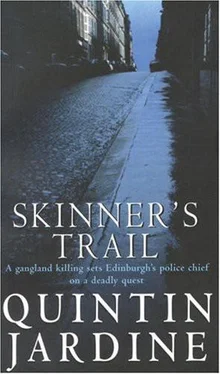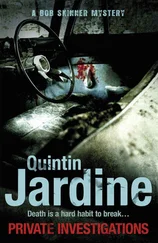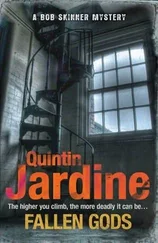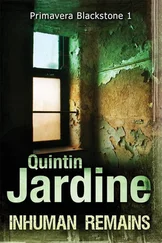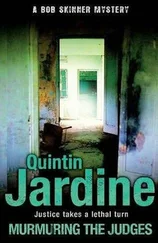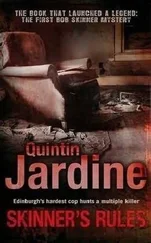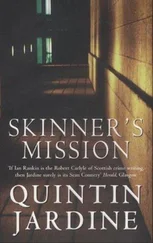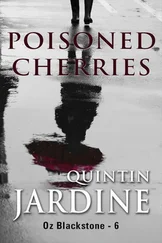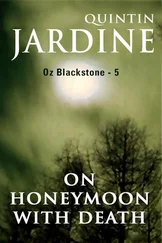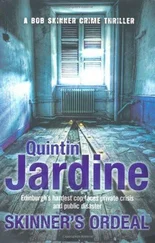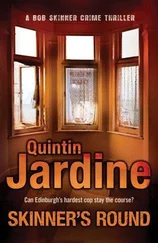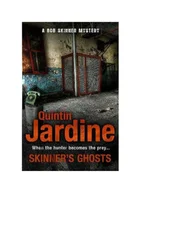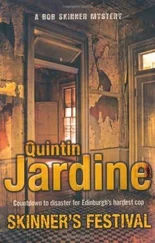Quintin Jardine - Skinner's trail
Здесь есть возможность читать онлайн «Quintin Jardine - Skinner's trail» весь текст электронной книги совершенно бесплатно (целиком полную версию без сокращений). В некоторых случаях можно слушать аудио, скачать через торрент в формате fb2 и присутствует краткое содержание. Жанр: Полицейский детектив, на английском языке. Описание произведения, (предисловие) а так же отзывы посетителей доступны на портале библиотеки ЛибКат.
- Название:Skinner's trail
- Автор:
- Жанр:
- Год:неизвестен
- ISBN:нет данных
- Рейтинг книги:4 / 5. Голосов: 1
-
Избранное:Добавить в избранное
- Отзывы:
-
Ваша оценка:
- 80
- 1
- 2
- 3
- 4
- 5
Skinner's trail: краткое содержание, описание и аннотация
Предлагаем к чтению аннотацию, описание, краткое содержание или предисловие (зависит от того, что написал сам автор книги «Skinner's trail»). Если вы не нашли необходимую информацию о книге — напишите в комментариях, мы постараемся отыскать её.
Skinner's trail — читать онлайн бесплатно полную книгу (весь текст) целиком
Ниже представлен текст книги, разбитый по страницам. Система сохранения места последней прочитанной страницы, позволяет с удобством читать онлайн бесплатно книгу «Skinner's trail», без необходимости каждый раз заново искать на чём Вы остановились. Поставьте закладку, и сможете в любой момент перейти на страницу, на которой закончили чтение.
Интервал:
Закладка:
He shook his head. 'Can't wait any longer,' he muttered to himself. He stepped out of the car, and clambered over the gate with surprising agility for a man in his mid-forties.
The Botanics, as the people of Edinburgh know it, is one of the world's great gardens, set in seventy acres in the heart of Scotland's capital. Every day, save Christmas and New Year, it offers free access to thousands of visitors who walk its leafy paths among the trees, plants and shrubs, admiring and sometimes feeding the pigeons, ducks and impertinent squirrels who animate the scene.
The centrepiece of the Botanics is its great glasshouse. As Skinner emerged into the wide open space of the garden, he saw it three hundred yards away, silhouetted massively against the northern skyline. To prevent any chance of his being spotted in the moonlight, he hugged the trees to his right as he ran towards the building, taking extra cover from their darkness, but occasionally leaving the grass and cutting through the planted beds. Soon, he had reached the steps which led up towards the scientific study centre. He looked along the length of the Glasshouse, but saw no figures, no shapes, no movement. Pressing himself against the glass wall, he crept silently along towards the main entrance.
The flash of moonlight from the slivers of glass on the ground caught his eye before he reached the doorway. He froze for a second, listening, but heard nothing. Very slowly he advanced towards the entrance, moving lightly on his feet. When he had almost reached it, he broke away from the wall in a wide sweep and flattened himself against a tree opposite the doorway. One of the double doors was wide open, allowing him a clear view into the reception area. It was empty. Taking a deep breath, he pushed himself off from his tree and reached the door in a few strides, taking care not to step on the broken glass lest he make a sound. Inside the small hallway, a corridor led off to the right towards offices and to the scientific centre. To the left, another door led to the glasshouse itself. He stepped past the reception desk and tried its handle. It opened silently, and Skinner slipped into the first gallery of the great glass structure.
The door closed automatically behind him and, as it did, he looked around. Moonbeams shone through the higher branches of the trees and bushes, casting weird shadows on the paved walkways which led visitors through each section of the exhibition. He listened again, but still the silence was total. Then, through the foliage, he caught a flash of artificial light. He moved towards the source, almost on tiptoe, until he came to a second door. Through its glass, he could make out, to his left, a series of illuminated panels in which floated an assortment of aquatic plants, their fronds moving in the tanks' continuous aeration. He opened the door and stepped into the expected darkness beyond.
At once, he knew that he had arrived too late for Paul Ainscow.
The thick glass panel on his right was around ten feet wide and five feet high. It was back-lit and offered a view of the lily-pond which was the centrepiece of the upper area of the glasshouse. Ainscow's body was still settling on to the round stones and pebbles which made up the bed of the lily-pond — settling down to an eternal sleep. The corpse lay close to the glass, facing Skinner as he looked on in resigned horror. The eyes stared, wide and round. The normally sleek hair drifted, Afro-style, in the water. The head lay at an odd angle, strange enough to tell Skinner at once that drowning would not feature on the death certificate. The body lay on its side, the right arm thrown up and over the head, palm and wrist pressed against the glass. Skinner stepped forward and looked at the wrist. There, at the base of the thumb, vivid against the whiteness of death, he saw three small, pink semicircular scars.
`Knew it,' he whispered, softly, to himself.
Suddenly, his eye was caught by movement above and beyond the body, above the moonlit surface of the pond. There was a figure framed there, bent over as if peering into the pond to make sure that Ainscow was not about to resurface.
Moving as if his life depended on his silence, and imagining that it might, Skinner slipped back out of the aquarium room and looked up. The pathway to the lily-pond gallery was ten feet above his head. The steps leading up to it were at the far end of the area in which he stood. He paused for a moment and looked around, until his eye lit upon a strange, long tree-trunk, similar to a palm, but with deciduous leaves. It reached up to and over the path above his head. He grasped it and began to climb, monkey-style, hands and feet digging for purchase into the rough, thick bark, sweeping small twiglet branches aside, scrambling up and up until the trunk began to curve and he was straddling it, perched above the walkway.
He sat and stared at the door to the lily-pond gallery, trying to decide his next move. But it was decided for him.
The glass door opened, framing a figure, silhouetted black in the moonlight — a huge figure.
Skinner jumped down from the tree. The man froze, then moved back into the pool gallery. Skinner followed, watching him through the glass panel as he backed away. He opened the door and stepped through. The gallery was lit by the moon, and by its reflection from the surface of the pool.
The man had stopped his retreat. He stood there waiting, a great dark slab, towering and vast. Skinner was six-two himself, but this giant stood almost a full head taller, straight-backed, wide-shouldered, and built like a bulldozer.
Oh shit, Skinner thought, of all the times for the cavalry to go missing!
`Hello, Lennie.
He had forgotten just how big Lennie Plenderleith was. He felt eyes boring into him, even in the dark. Eventually the mountain spoke.
`It's Mr Skinner, isn't it?'
It was possibly the most incongruous voice that he had ever heard. While its owner was huge and threatening, the voice was soft, slow and gentle, almost soothing in its tone. It struck Skinner that it might just have been that of a telephone Samaritan. 'You sound as if you were expecting me.'
‘I was. Officially we've been setting traps for a Frenchman, but I was pretty certain that it would be you who turned up. I did some private research on you, Lennie. You're not the big thick muscleman that you and Tony wanted us to see, are you? You were going to night-school classes even when you were working in that pub in Leith Walk. And while you were inside you were never out of the library. Correspondence courses in — what were they? — business admin, economics and Spanish. Who paid for them? Linda?'
Plenderleith shook his massive head. 'You're joking. No, Tony did.'
'He was grooming you, Lennie, wasn't he? You were going to be his right-hand man when you got out, weren't you? His adopted heir? What was that about a will in Cocozza's message? He had told us he couldn't find one. Was that just a way to get Ainscow here, or does it exist?'
There was a gleam in the dark as the big man smiled. 'Oh yes, Tony left a will all right. He gave it to me when he visited me in Shotts just before I got out. He thought it would be a long time before it was needed, though. He didn't think anyone could touch him.' Lennie gave a soft tinkling chuckle. `He reckoned even God would think twice about having a go at him. Tony took me under his wing years ago. I was giving some trouble to the manager of one of his launderettes. Back then, I thought I could make it big in the protection racket. I read The Godfather and thought that was for me. So I went into this launderette, and told the manager it was ten quid a week or his windows were in, and after that his face. And then the real Godfather came to the launderette to see me: Tony Manson. He was younger then, and not quite as smooth as he was later on. The hardest man I'd ever seen. It just radiated off him. He never said a word, just looked at me, and I knew that this man could kill me, and would if it came to it. So I said, "Sorry, I didn't understand. I won't bother this place again," and Tony said, "That's good. I like a quick learner. Sit down." And he talked to me. He asked me about myself, and I told him. We sat there for about three hours, cracking a few beers and talking, and at the end of it Tony offered me a job. He said he fancied making me his secret weapon.
Читать дальшеИнтервал:
Закладка:
Похожие книги на «Skinner's trail»
Представляем Вашему вниманию похожие книги на «Skinner's trail» списком для выбора. Мы отобрали схожую по названию и смыслу литературу в надежде предоставить читателям больше вариантов отыскать новые, интересные, ещё непрочитанные произведения.
Обсуждение, отзывы о книге «Skinner's trail» и просто собственные мнения читателей. Оставьте ваши комментарии, напишите, что Вы думаете о произведении, его смысле или главных героях. Укажите что конкретно понравилось, а что нет, и почему Вы так считаете.
